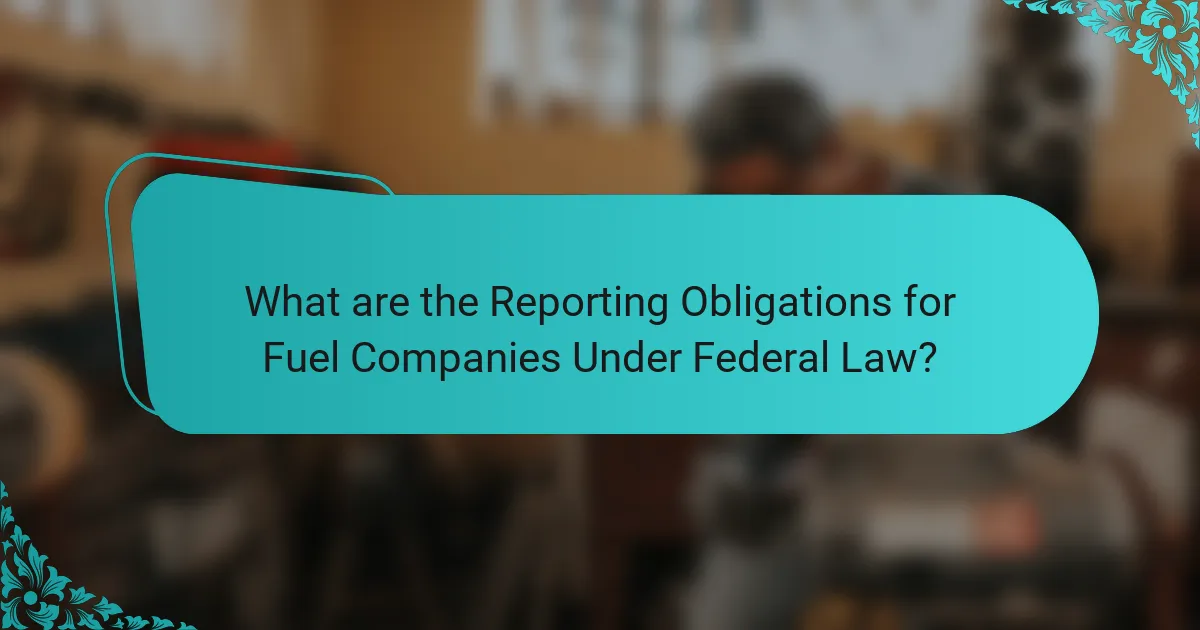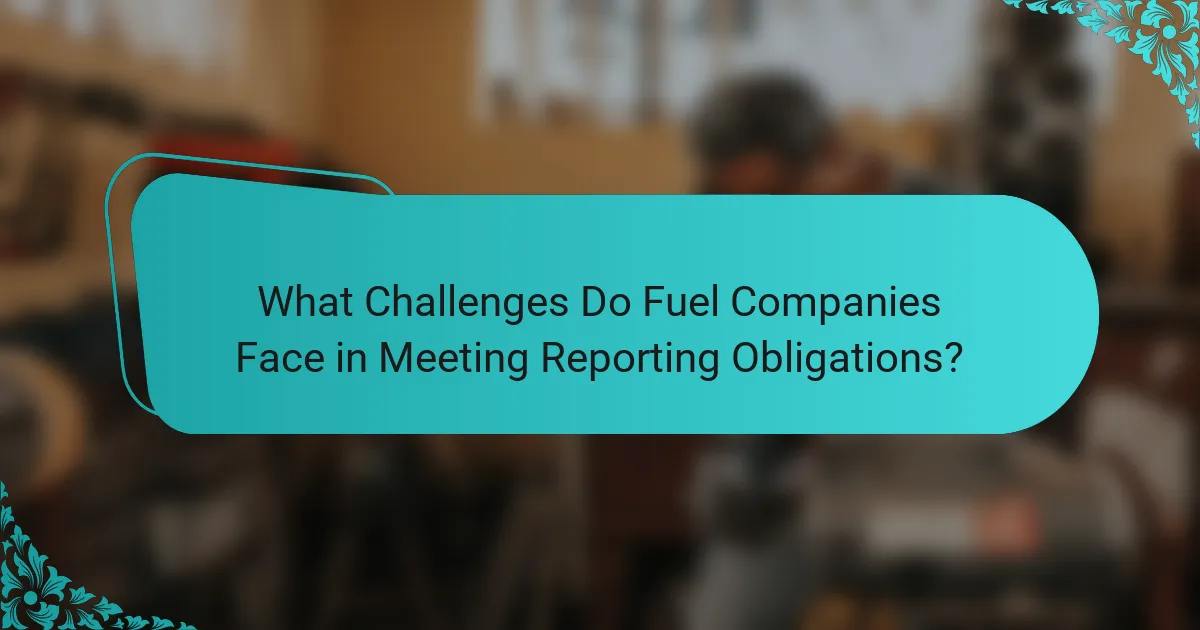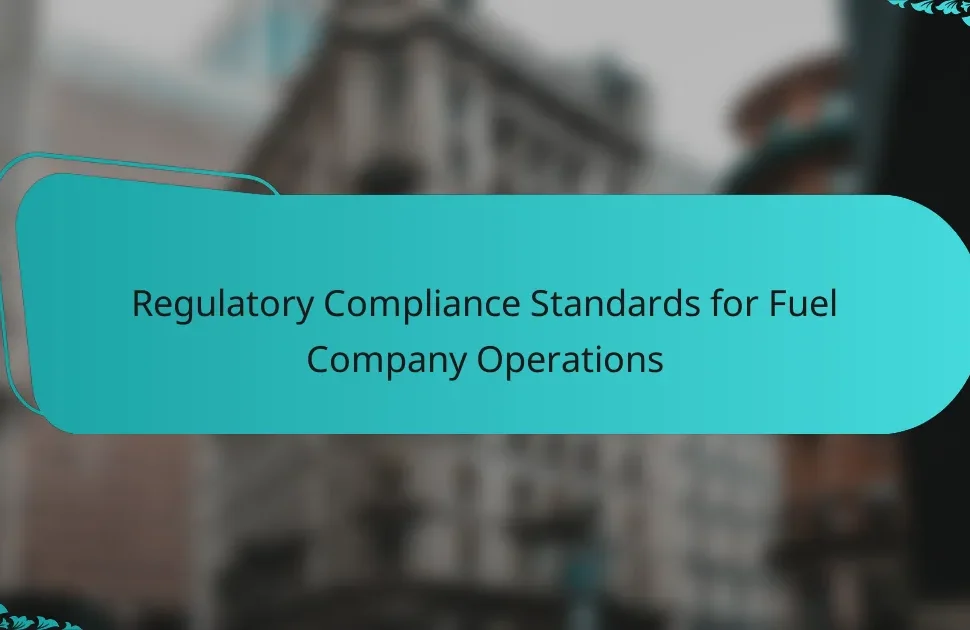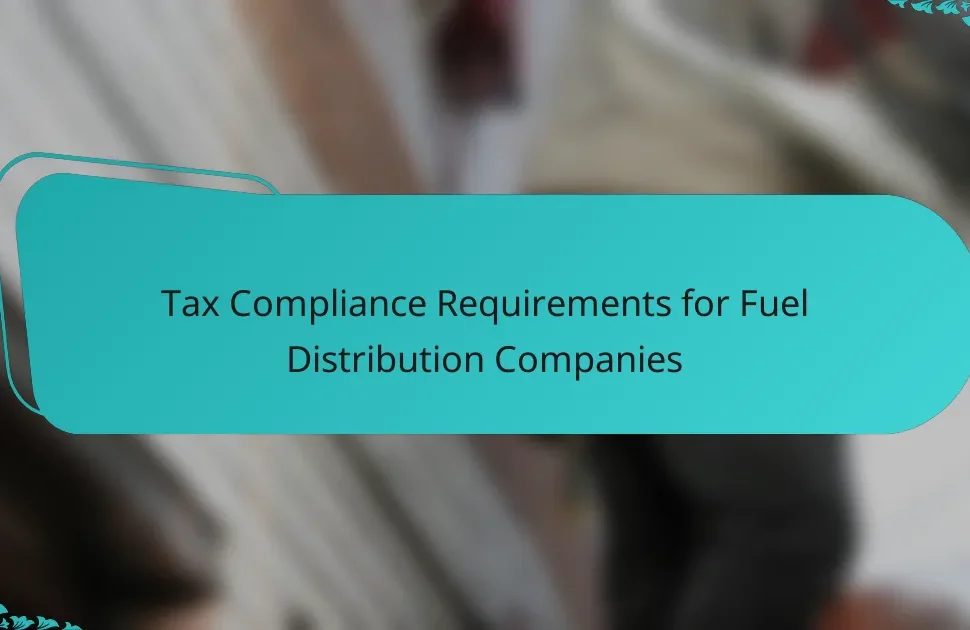
What are the Reporting Obligations for Fuel Companies Under Federal Law?
Fuel companies are required to report various data under federal law. They must submit reports on emissions, production, and distribution of fuel. The Environmental Protection Agency (EPA) mandates these reporting requirements. Companies must comply with the Clean Air Act and the Clean Water Act. They are also subject to the Energy Policy Act, which includes reporting on energy production and consumption. Failure to comply can result in penalties and fines. Reporting is essential for regulatory oversight and environmental protection.
Why are Reporting Obligations Important for Fuel Companies?
Reporting obligations are important for fuel companies to ensure compliance with federal regulations. These obligations help maintain transparency in operations. They provide essential data regarding fuel production, distribution, and emissions. Accurate reporting aids in regulatory oversight and environmental protection. It also fosters trust with stakeholders and the public. Non-compliance can lead to significant penalties and legal repercussions. For instance, the Environmental Protection Agency (EPA) enforces strict reporting standards. Adhering to these requirements can enhance a company’s reputation and operational integrity.
What are the potential consequences of non-compliance?
Non-compliance with reporting obligations for fuel companies can lead to significant penalties. These penalties may include hefty fines imposed by regulatory authorities. For example, the Environmental Protection Agency (EPA) can impose fines up to $37,500 per day for violations. Additionally, non-compliance can result in legal actions, including lawsuits from affected parties. It may also lead to increased scrutiny and audits from regulatory bodies. Repeated violations can result in loss of licenses or permits necessary for operation. Furthermore, reputational damage can occur, impacting relationships with stakeholders and the public. Overall, the consequences of non-compliance can severely affect a fuel company’s financial and operational stability.
How do reporting obligations protect the environment and public health?
Reporting obligations ensure that fuel companies disclose information about their environmental impact and health risks. These requirements promote transparency and accountability. By mandating regular reporting, regulatory agencies can monitor compliance with environmental standards. This oversight helps identify potential hazards early, preventing environmental degradation. Public access to this information empowers communities to advocate for their health and environment. Studies show that transparency in reporting correlates with reduced pollution levels. For example, the Toxic Release Inventory has led to significant reductions in toxic emissions since its inception. Overall, reporting obligations are crucial for safeguarding environmental integrity and public health.
What Types of Reports Must Fuel Companies Submit?
Fuel companies must submit various reports to comply with federal regulations. These include Environmental Protection Agency (EPA) reports, which detail emissions and environmental impacts. Companies must also file financial reports to the Securities and Exchange Commission (SEC). Additionally, they are required to submit safety reports under the Occupational Safety and Health Administration (OSHA) guidelines. Each of these reports serves to ensure compliance with federal laws and regulations. For instance, the EPA requires annual emissions reporting under the Clean Air Act. The SEC mandates financial transparency to protect investors. OSHA safety reports help maintain workplace safety standards.
What are the specific federal regulations governing these reports?
The specific federal regulations governing these reports include the Energy Policy and Conservation Act (EPCA). EPCA mandates fuel companies to report data on inventory levels, production, and sales. Additionally, the Federal Energy Regulatory Commission (FERC) oversees compliance with reporting requirements. Companies must adhere to the regulations set forth in 18 CFR Part 201 and 18 CFR Part 260. These regulations ensure transparency and accountability in fuel reporting. Violations can result in penalties as outlined in the regulations. The Department of Energy also provides guidelines for accurate reporting under federal law.
How often must fuel companies submit these reports?
Fuel companies must submit these reports quarterly. This requirement ensures regular oversight and compliance with federal regulations. The quarterly submission allows regulatory bodies to monitor fuel supply and pricing effectively. Additionally, this frequency helps maintain transparency in the fuel market.
Who is Responsible for Ensuring Compliance with Reporting Obligations?
Fuel companies are responsible for ensuring compliance with reporting obligations under federal law. This responsibility typically falls on designated compliance officers within the organization. These officers must be knowledgeable about relevant regulations. They ensure that all required reports are accurately prepared and submitted on time. Additionally, senior management holds ultimate accountability for compliance. They must establish internal controls to monitor adherence to reporting requirements. Regulatory agencies may also conduct audits to verify compliance. Failure to meet these obligations can result in significant penalties and legal repercussions.
What role do compliance officers play in fuel companies?
Compliance officers in fuel companies ensure adherence to regulations and laws. They monitor compliance with federal, state, and local environmental laws. This includes regulations on emissions and waste management. Compliance officers develop and implement internal policies to promote legal adherence. They conduct regular audits and assessments to identify compliance gaps. Training employees on compliance matters is also a key responsibility. They report findings to management and recommend corrective actions. Their role is crucial for avoiding legal penalties and safeguarding company reputation.
How can fuel companies train their staff on reporting requirements?
Fuel companies can train their staff on reporting requirements through structured training programs. These programs should include workshops focusing on federal regulations. Regular updates should be provided to keep staff informed of any changes in legislation. Interactive sessions can enhance understanding of compliance processes. Utilizing case studies can illustrate real-world scenarios related to reporting. Assessment quizzes can evaluate staff knowledge and retention of information. Additionally, providing access to online resources ensures ongoing learning. Documentation of training completion is essential for compliance verification.

What Challenges Do Fuel Companies Face in Meeting Reporting Obligations?
Fuel companies face several challenges in meeting reporting obligations. Regulatory complexity is a significant issue. Fuel companies must navigate various federal, state, and local regulations. These regulations often have different requirements and deadlines. Compliance can be resource-intensive and time-consuming.
Data accuracy is another challenge. Companies must ensure that the data they report is precise and reliable. Inaccurate reporting can lead to penalties and reputational damage. Additionally, the evolving nature of regulations adds to the difficulty. Changes in laws can require rapid adjustments in reporting practices.
Technological limitations can hinder efficient reporting. Some companies may lack advanced systems for data collection and reporting. This can lead to delays and errors in submissions. Training staff on compliance requirements is also necessary. Employees must be knowledgeable about regulations to ensure adherence.
Lastly, the financial burden of compliance can be significant. Investing in compliance programs and technologies can strain resources. These challenges collectively complicate the ability of fuel companies to meet their reporting obligations effectively.
How can fuel companies address data accuracy in their reports?
Fuel companies can address data accuracy in their reports by implementing robust data management systems. These systems should include automated data collection processes to minimize human error. Regular audits of data sources can further ensure accuracy and reliability. Training employees on data reporting standards is essential for maintaining consistency. Utilizing advanced analytics tools can help identify discrepancies in reported data. Additionally, establishing clear protocols for data validation can enhance overall reporting integrity. According to the U.S. Environmental Protection Agency, accurate reporting is crucial for compliance with federal regulations. This ensures that fuel companies meet their legal obligations while promoting transparency.
What tools and technologies can assist in data collection and reporting?
Data collection and reporting can be facilitated by various tools and technologies. Common tools include data management software, such as Microsoft Excel and Google Sheets. These applications allow users to organize and analyze data efficiently. Additionally, specialized reporting tools like Tableau and Power BI enable visual data representation. They help in generating comprehensive reports that meet regulatory requirements. Survey tools like SurveyMonkey can assist in gathering data directly from stakeholders. Furthermore, cloud-based platforms like AWS and Azure offer scalable storage and processing capabilities. These technologies ensure secure and accessible data management. Overall, the combination of these tools enhances the accuracy and efficiency of data reporting for fuel companies under federal law.
What are common pitfalls that lead to reporting errors?
Common pitfalls that lead to reporting errors include inaccurate data entry, misinterpretation of regulations, and lack of standardized procedures. Inaccurate data entry occurs when information is incorrectly recorded, leading to flawed reports. Misinterpretation of regulations happens when companies fail to fully understand reporting requirements, resulting in non-compliance. Lack of standardized procedures can cause inconsistencies in reporting practices across departments. According to the U.S. Government Accountability Office, 30% of reporting errors stem from these issues. Additionally, inadequate training for staff can exacerbate these pitfalls, as employees may not be familiar with proper reporting protocols.
What Resources are Available for Fuel Companies to Navigate Reporting Requirements?
Fuel companies can access various resources to navigate reporting requirements. These resources include federal guidelines, industry associations, and compliance software. The Environmental Protection Agency (EPA) provides comprehensive regulations and guidance documents. The American Petroleum Institute (API) offers best practices and compliance assistance. Additionally, specialized consulting firms provide tailored support for reporting processes. Online training programs also help employees understand reporting obligations. These resources collectively facilitate adherence to federal reporting requirements for fuel companies.
What government agencies provide guidance on reporting obligations?
The government agencies that provide guidance on reporting obligations include the Environmental Protection Agency (EPA) and the Department of Energy (DOE). The EPA oversees regulations related to environmental reporting for fuel companies. The DOE provides guidelines on energy-related reporting requirements. Both agencies publish resources and compliance assistance documents. These documents help fuel companies understand their obligations under federal law. Compliance with these guidelines is essential for legal operation.
How can industry associations support fuel companies in compliance?
Industry associations can support fuel companies in compliance by providing guidance on regulatory requirements. They can offer resources such as compliance manuals and training programs. These resources help companies understand federal laws and reporting obligations. Associations also facilitate communication between members and regulatory agencies. This communication can clarify compliance expectations and reduce misunderstandings. Additionally, industry associations often advocate for their members’ interests in legislative matters. They can influence policy changes that affect compliance requirements. Research shows that companies engaged with industry associations are more likely to remain compliant. This engagement fosters a culture of compliance within the industry.

What Best Practices Can Fuel Companies Implement for Effective Reporting?
Fuel companies can implement best practices for effective reporting by ensuring accuracy, transparency, and compliance. Accurate data collection is essential for reliable reporting. Companies should utilize automated systems to minimize human error. Regular audits of reporting processes can enhance transparency. Establishing clear reporting guidelines helps maintain consistency. Training employees on regulatory requirements ensures compliance with federal laws. Utilizing data visualization tools can improve understanding and accessibility of reports. Engaging stakeholders in the reporting process fosters accountability and trust.
How can fuel companies streamline their reporting processes?
Fuel companies can streamline their reporting processes by adopting digital reporting tools. These tools automate data collection and reporting tasks. Automation reduces human error and saves time. Implementing standardized reporting formats enhances consistency and clarity. Training staff on these tools improves efficiency and compliance. Regular audits of reporting processes identify areas for improvement. Integrating real-time data analytics provides insights for better decision-making. These strategies lead to more efficient and accurate reporting, aligning with federal law requirements.
What role does regular training play in maintaining compliance?
Regular training is essential for maintaining compliance in fuel companies. It ensures that employees are aware of federal laws and regulations. Training programs provide updates on changes in reporting obligations. They also reinforce the importance of accurate data collection and submission. Regular training can reduce the risk of non-compliance penalties. Compliance training often includes practical scenarios and case studies. This approach enhances understanding and retention of critical information. Studies show that organizations with ongoing training programs have higher compliance rates.
How can fuel companies leverage technology for efficient reporting?
Fuel companies can leverage technology for efficient reporting by implementing automated data collection systems. These systems can gather real-time data from various sources, such as fuel pumps and storage tanks. Automation reduces manual entry errors and saves time. Advanced analytics software can process this data to generate reports quickly. Cloud-based platforms enable easy access to reports from anywhere. Regulatory compliance can be ensured through software that tracks changes in reporting requirements. Additionally, digital dashboards provide visual insights into key performance indicators. These technological solutions enhance accuracy and streamline the reporting process for fuel companies.
What Common Mistakes Should Fuel Companies Avoid in Reporting?
Fuel companies should avoid inaccuracies in data reporting. Incorrect data can lead to regulatory penalties. Companies must ensure compliance with federal reporting requirements. Lack of transparency can damage credibility with stakeholders. Failing to meet deadlines can result in fines. Misinterpretation of regulations can lead to non-compliance. Inadequate documentation can hinder audits and reviews. Lastly, neglecting to update reports with new information can misinform stakeholders.
How can companies ensure their reports are complete and accurate?
Companies can ensure their reports are complete and accurate by implementing rigorous data verification processes. This includes cross-checking figures against source documents and utilizing automated software for error detection. Regular audits should be conducted to identify discrepancies. Training employees on reporting standards and compliance is essential. Establishing a clear reporting framework helps maintain consistency. Engaging third-party reviewers can provide an objective assessment of report accuracy. Documentation of all processes supports accountability and traceability. These practices collectively enhance the reliability of reports, ensuring adherence to federal reporting obligations.
What steps can be taken to review reports before submission?
To review reports before submission, follow these steps. First, ensure all data is accurate and complete. Check for discrepancies in figures and sources. Next, verify compliance with relevant regulations. Review the formatting and structure for consistency. Involve a second reviewer for an additional perspective. Evaluate the clarity of the language used. Finally, confirm that all necessary approvals are obtained. These steps enhance the quality and reliability of the reports submitted by fuel companies under federal law.
What Final Tips Can Fuel Companies Follow for Successful Compliance?
Fuel companies should establish a comprehensive compliance program. This program must include regular training for employees on federal regulations. Companies should also implement robust record-keeping practices. Accurate documentation supports compliance and facilitates audits. Regular internal audits can identify potential compliance gaps. Engaging legal counsel ensures that companies stay updated on regulatory changes. Collaboration with industry peers can provide insights into best practices. Finally, establishing a culture of compliance within the organization promotes accountability and adherence to regulations.
The main entity of this article is the reporting obligations for fuel companies under federal law. Fuel companies must comply with various reporting requirements mandated by federal regulations, including emissions, production, and distribution data, as outlined by the Environmental Protection Agency (EPA) and other regulatory bodies. The article discusses the importance of these obligations for regulatory oversight and environmental protection, the potential consequences of non-compliance, and the types of reports required. It also addresses the challenges fuel companies face in meeting these obligations, best practices for effective reporting, and resources available to assist in compliance.




